Content
- 1 "In any incomprehensible situation, drink tea!"
- 2 How do Turks make tea?
- 3 How is Turkish tea drunk?
- 4 Where to buy Turkish tea?
- 5 What tea to bring from Turkey?
- 6 1. Çaykur (Chaikur)
- 7 2. Doğuş (Doush)
- 8 3. Doğadan
- 9 4. Lipton
- 10 5. Karali (Karali)
- 11 6. Beta Tea
- 12 7. Kipa
- 13 8. Şölen (Sholen)
- 14 9. Champion
- 15 10. Ofçay
- 16 Turks drink tea "wholesale"
- 17 Flower and fruit teas and others like them
- 18 Turkish tea varieties
- 19 Popular communities and blogs related to Turkey on social media:

Dear readers and readers of my blog! Hello!
Turkish tea is known all over the world for a variety of reasons that go beyond the quality of the product itself.
In our country, many still remember the funny ad “Mom, Mom, you promised to teach me how to make tea!”, Where an indignant girl, with a slight oriental accent, presses her sleepy mother in the morning.
Mass Russian tourism, after Turkish tea was tasted, raised a completely legitimate question - What tea to bring from Turkey?
However, it would be wrong to go straight to the list of brands and prices without dedicating a few words to the phenomenon of Turkish tea.
No one has any doubts that Turkish tea is the same phenomenon as Turkish tourism with its all-inclusive system? I even doubted which section to include the article “Purchases" or "Culture", But stopped at the second
"In any incomprehensible situation, drink tea!"
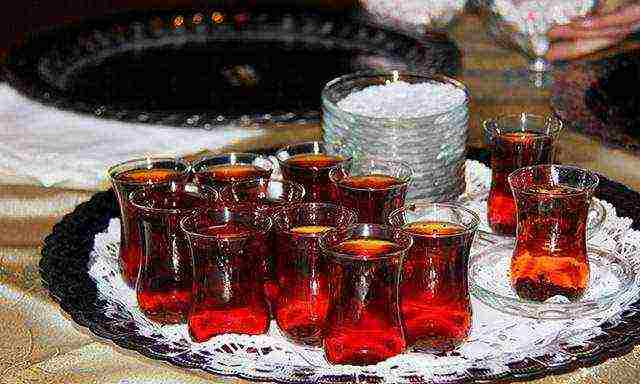
This phrase could well become an advertising slogan of some Turkish tea brand, given the fact that Turks drink this drink anytime, anywhere, regardless of the time of day, place and weather conditions.
Today, Turkey ranks first in the world in terms of the amount of tea consumed.
The per capita population of this country accounts for 3.5 kg per year, while in its production it occupies only the fifth place - only 259 thousand tons per year ("only", because China occupies a leading position with its 2 million 270 thousand tons per year).
Turkish tea is a kind of symbol of hospitality and goodwill, a guarantee of a sincere conversation or a good deal, and even, according to some, an antidepressant. It is not surprising that he is so popular among his own people and arouses such interest among foreigners.
Although, if you drink tea wherever it is offered, very soon you can feel like an aquarium, in which it is time to launch fish.
How do Turks make tea?
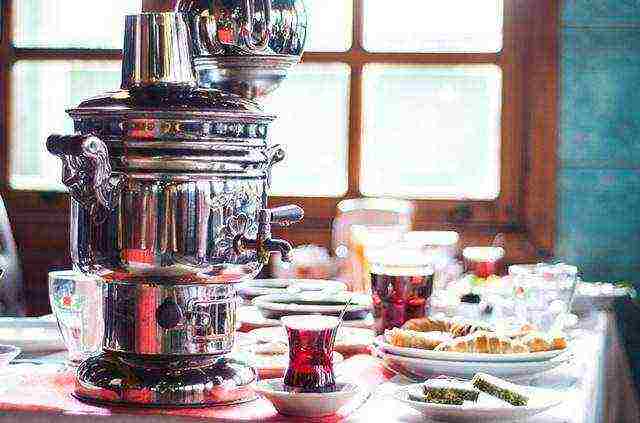
In order for the tea to be strong, fragrant and look good, becoming as dark as the local population, it is brewed in a two-story teapot, arranged according to the principle of a samovar, and almost also called - "Semaver".
That is, in the lower, larger one, boiling water is "cooked", and in the upper one, generously poured tea leaves are languishing in a water bath. On average, this simple process takes 20 - 30 minutes.
Immediately I remembered an old joke with a beard about the death of a Jew and about his secret of making tea, which he almost took with him to the grave, but with a death rattle he still cracked: "Sarah, do not regret the tea leaves!" There is no such problem in Turkey. Nobody regrets brewing here
How is Turkish tea drunk?
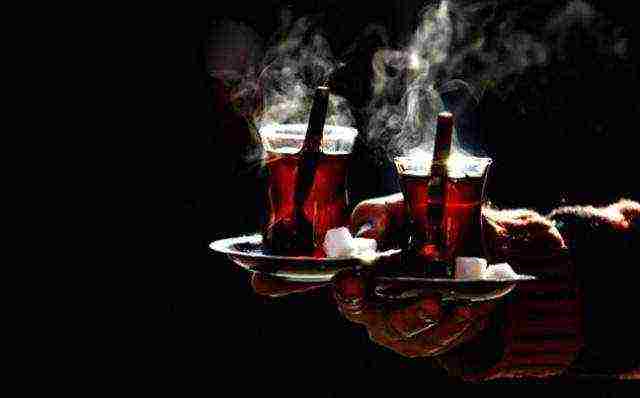
Turks treat tea with great respect, drinking it for breakfast, lunch and dinner ... and in between. The quantity is absolutely unimportant, the main thing is that from a glass cup in the shape of a tulip.
Then you can fully appreciate the color of the drink, feel its warmth and even get burned a couple of times, and listen to the melodic ringing of the spoon hitting the glass, stirring the sugar.
Although, the last point may not be, if you, for example, in Erzurum, where sugar is simply eaten with a bite and savor, washed down with hot tea.
Traditional Turkish tea brewed according to all the rules has a rich color and a very bitter taste, therefore, if you are not confident in your abilities, I recommend asking for “achik tea” (or “açık çay”), that is, light, weak.
As a treat, hospitable hostesses offer all kinds of "nibbles" such as cookies, nuts, seeds and even popcorn.In a cafe, on a tray, in addition to a couple of cookies, they can bring a small bunch of flowers in the kit.
Where to buy Turkish tea?
Let's say right away: tea boutiques have just begun to appear in the country. And they sell not Turkish, but exotic varieties of imported teas.
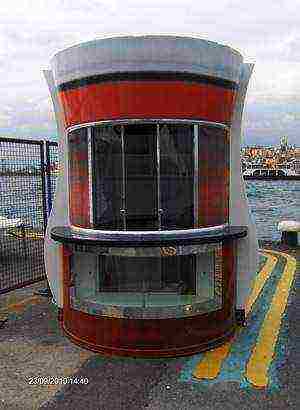
(Tea boutique a la Turk)
So, the widest assortment of tea is presented in large chain supermarkets such as Migros, Kipa, Carrefour, Metro, etc. There is tea in bags and loose leaves, black classic and floral, Turkish and not so much.
It is not easy to choose the right one among all this variety, but there will certainly be exactly the one that will suit your taste.
What tea to bring from Turkey?
So, I present to your attention the most popular brands of tea.
1. Çaykur (Chaikur)
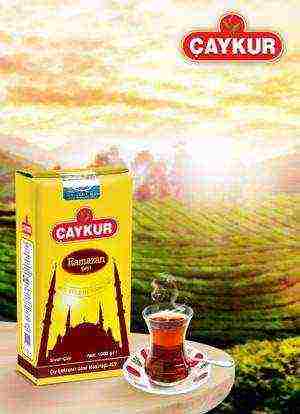
The company, which was born in the 80s, over the years of its existence under the strict government leadership, has collected tea leaves on the Rize plantations for the position of the leader in the region for the production of tea.
Today Çaykur walks around the country with the slogan "Real Turkey Tea", which, in principle, corresponds to reality, since it was grown without the use of pesticides and does not contain chemical additives.
Price for 1 kg (hereinafter, without special discounts): 25-30 liras (400-480 rubles)
2. Doğuş (Doush)
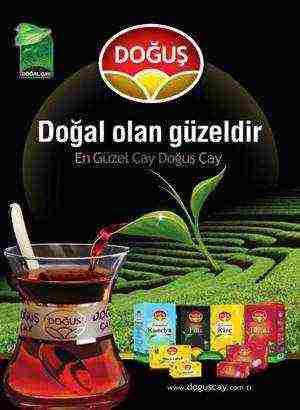
In 1985, the company started a family business with the production of black leaf tea. Over the years, the assortment has increased; tea bags, green, floral and fruit, have entered the shelves.
Today, Doğuş is among the leaders due to "quality standards, excellent taste, perfect color and unique smell." According to the advertising slogan, “the best tea is Doğuş tea”.
Price for 1 kg: about 25 liras (400 rubles)
3. Doğadan
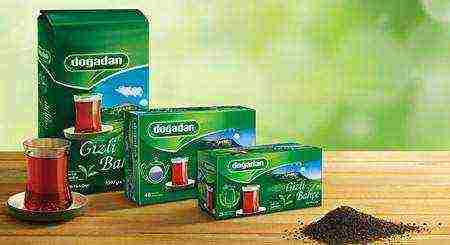
By purchasing the best raw materials on 5 continents, carrying out hundreds of chemical and microbiological analyzes at all stages of production, this company has been treating tea lovers not only with delicious, but also healthy drink for more than 40 years.
Doğadan tea is distinguished by original combinations of different ingredients, such as ginger-linden-honey.
Price for 1 kg: about 25 liras (400 rubles)
4. Lipton
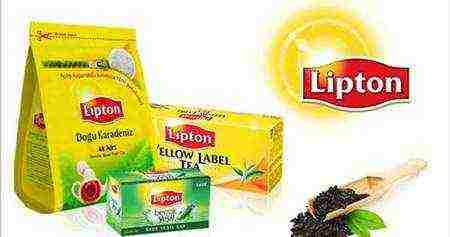
There is not much to say about this brand, it is already one of the most popular and best-selling in the world. Lipton entered the Turkish tea market in 1986 and has not left it since then.
“The taste, color and aroma of brewed Turkish tea remain unchanged from the first to the last glass,” says the manufacturer, who has become a transnational corporation in all respects long ago.
Price for 1 kg: 25 - 30 liras (400-480 rubles).
5. Karali (Karali)
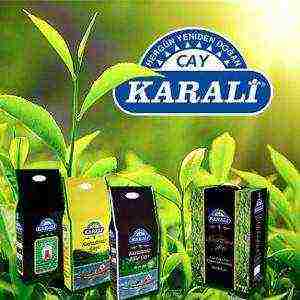
Established relatively recently, in 1993, the company is taking leaps and bounds along the path of development of the tea industry with the motto "quality first", adapting to the constantly growing demands of consumers.
The Karali tea brand has been awarded the "Golden Mark" award in Turkey as the most beloved and preferred one, and that, perhaps, says it all.
Price for 1 kg: 20 - 25 liras (320-400 rubles)
6. Beta Tea
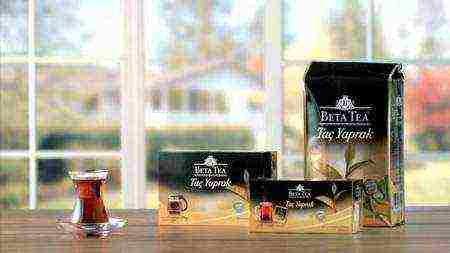
Beta Gıda at the beginning of its journey was a small Turkish company, which was the first to introduce Turkish tea lovers to a new taste, having established the supply of raw materials from Sri Lanka. After the collapse of the USSR, it became the first exporter of tea to the countries of the former Soviet Union.
Today, the assortment of varieties and types of tea produced under the Beta Tea brand will make even a sophisticated buyer confused: in addition to the usual black tea, there are also many exotic and elite varieties, both in ordinary packaging and in expensive metal boxes.
Price for 500 g: 20 - 70 lire (320 - 1120 rubles)
7. Kipa
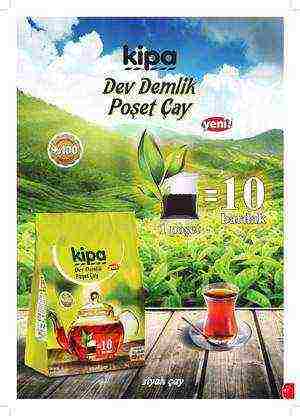
Kipa is a hypermarket chain established in the 90s. Like many other large retail chains, it produces goods under its own trademark, including tea.
It is, in principle, as good as all of the above, it also meets international quality standards and undergoes many checks. Only cheaper.
Price for 500 g: about 10 liras (160 rubles)
8. Şölen (Sholen)
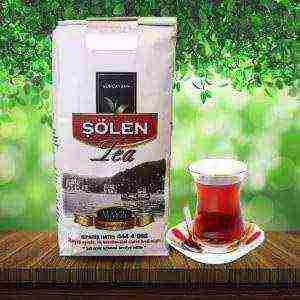
The Şölen brand tea is produced by the Turkish company Sürçaysan, which has existed for more than 30 years.
The assortment is presented in two lines: special May tea and special flower tea.The peculiarity lies in the fact that the raw materials for it are collected in May, from the first, tender and fresh tea leaves. This drink is the most delicious, aromatic and healthy.
Price for 500 g: about 10 liras (160 rubles)
9. Champion
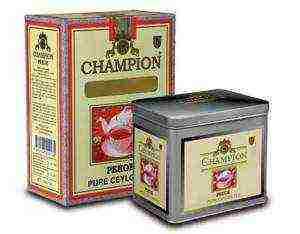
Another brand of Beta Gıda, which occupies the premium price segment of the tea market.
Champion Pekoe is a high quality Ceylon tea with an exquisite tart taste, rich color and rich aroma for true gourmets.
Price for 500 g: about 45 liras (720 rubles)
10. Ofçay
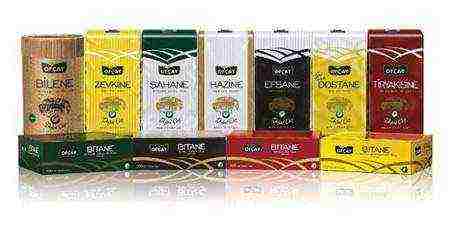
The company is a perfectionist that achieved success in the industry in 1987, following the principles of "quality first" and "without the past there is no future."
Ofçay creates new forms of tea that are comfortable to use in everyday life, while maintaining the good old taste. She is the pioneer in the invention of special long-lasting square tea bags for traditional teapot brewing and in the creation of “winter” tea blends.
Price for 1 kg: 20 - 25 liras (320 - 400 rubles)
Turks drink tea "wholesale"
Surely, many of you are accustomed to seeing tea bags or loose leaves in packs of 100-200 grams on store shelves. The situation is quite different in Turkey. Large containers are not at all uncommon here, quite the contrary. This explains the prices I quoted above per kilogram, in contrast to tea boutiques, where tea is weighed by pharmaceutical scales.
In general, Turkey is a generous soul!
Flower and fruit teas and others like them
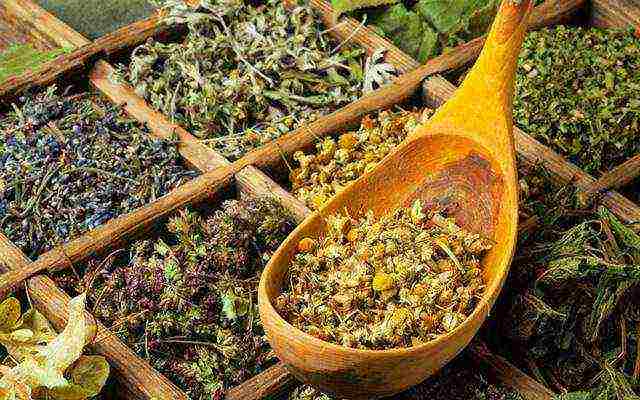
In addition to traditional black tea, almost all brands offer a wide range of fruit and floral varieties.
The latter are in special demand, since they have not only a softer and more unusual taste, but are also extremely useful.
Other healing properties include calming and toning effects, improving the functioning of the digestive system, removing toxins, beneficial effects on the cardiovascular system and supporting the immune system in general.
It is also convenient to buy various flower and fruit collections in the shops - "manavah" (manav).
Turkish tea varieties
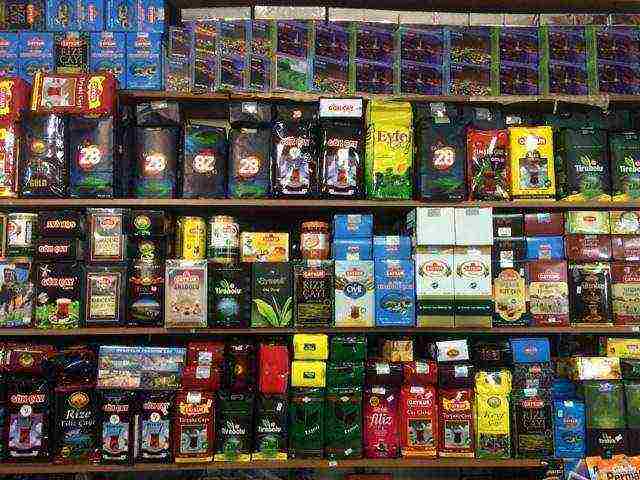
Before classifying all the tropical riot of tea varieties, I would like to make a reservation that green, flower and fruit varieties can be produced both independently and in combinations.
- Black: Turkish and Ceylon.
- Green with: jasmine, bergamot, lemon, mint, cloves, ginger, cinnamon.
- Floral: sage, chamomile, linden, lemon balm, dill, echinacea, mint, rose hips.
- Fruity: Apple, Apricot, Blackberry, Red Berry Mix, Blue Berry Mix.
- Winter: combinations of herbs and spices.
- Chinese white tea.
- Tea "Form" or "Fit Slim" to keep in shape.
- Regional: Black Sea, Aegean, Southeast.
There are also "fake" teas, or powdered ones. They are sold in multicolored bulk in shops with sweets and in packages that are convenient for presenting to friends at home.
Quite often, such apple or pomegranate "tea", both hot and cold, is offered at the resorts by the kind merchants of their potential foreign buyers, assuring that this is the real Turkish tea!
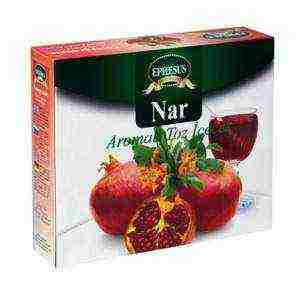
In response, I just want to take them by the breasts and shake them a couple of times "I will teach you ... to love the Turkish homeland and brew tea!"
So to the question What tea to bring from Turkey? we answer - any of the listed options and more.
Have a nice day and good mood, and I went to drink ... Turkish tea!
P.S. Those who are interested not only in Turkish tea, but also in Turkish coffee - welcome here.
What could be better than strong brewed fragrant tea in the morning or after a tiring day?
Turks are famous for their love of tea, Russians are also not far behind in this regard. The brewing methods, popular brands, are naturally different. Similarity in long conversations, in a friendly aura hovering over the company over a cup of tea. Turkey has all the world famous brands of tea products, and which brands of Turkish tea taste the best?
There are a lot of recommendations, because Turkey is one of the largest tea producers in the world, everyone speaks about their favorite brand.
Popular communities and blogs related to Turkey on social networks:
“Russians in Antalya” is the largest Russian-speaking group of compatriots abroad with over 50,000 members.
Turkey News is the largest newsgroup in Turkey.
RusTurkey is an official public page. All the news is here every day!

 Rana
Rana
Doğuş filiz samiy lucsiy cornaya upakovka


 Saglam
Saglam
Beta one-time take, we use imported ones, friends bring Ahmed tea

 Rusça-Kırgızca Tercüman
Rusça-Kırgızca Tercüman
Beta and other Ceylon. When I lived in Russia, I only drove Çaykur from Turkey. Familiar taste))

 Elana
Elana
And I took Lipton for the parcel to send a large pack
 Andrey
Andrey
there is ahmad tea in the metro - earl gray, ceylon, jasmine. 15 lira for 20 sachets, 40 lira for a box with 250 grams. moreover, the packaging is not Russian, but of the emirates - so it is most likely of better quality than the one that is sold in the Russian Federation
1 replies Show more comments
After another trip to Turkey, I suddenly "got hooked" on Turkish tea. I tried to try it many times before, but it was very strong, then it was tart - in general, I did not understand. Recently returned from Istanbul. On this trip, almost no meal in Istanbul ended without tea. I realized that everyone prepares tea in different ways, different strength, color and taste. The most bespontovy is the so-called tourist. I found out about this in Antalya in Kaleici, when I asked for tea in Turkish, and I was offered a choice: Turkish or tourist.
Brought home a double teapot, brought a pack of tea
a little more expensive by weight, I've been experimenting for the second week, but I just can't get a normal result. There is a fortress, there is no aroma.
The best tea that I liked the most was served at Simit Sarayi in Istanbul, near the Sirkeci tram stop. It is delicious and aromatic.
Maybe someone was here?
How do you achieve the same taste and aroma?
What? Defend water?
maybe you brew it wrong?
Local, not Krasnodar))
About brewing Turkish tea - already an imposing quote
Quote:
Of course, these pitiful leaves, which we consider to be tea, cannot be boiled! They will turn into a poison that cannot be taken into your mouth at all! But Trobzon or Iranian tea must be brewed. Turkish teapots are always two-story. Water boils in the lower one, and in the upper, while still dry, you need to put tea leaves. When the upper teapot warms up, boiling water is poured into it from the lower one, and fresh water is added to the lower one, and until the water in the lower one boils, it is not removed from the heat! Tea is brewed for about half an hour in a water bath, and I assure you, Nadya, that you have never drunk anything like it!
And why do you have the upper one in terms of volume almost the same as the lower one?
Andrina the top is smaller, it seems so in the photo)))
Quote:
Local, not Krasnodar))
Right!
The taste of tea depends on water as much as on the infusion.
I do not think that our water is worse ... We do not live in Krasnodar itself, we have good water ... It seems to be ... Let's try the spring.
Well, there are different ways to soften water.
This is really a mystery. We still have two Lipton bags from the hotel. How they got into the bag, I don't know))
Brewed, delicious, not to convey. Our Lipton in bags has a completely different taste))
How I Brew Turkish Tea:
I take about three full tablespoons of tea, rinse it under cold water. I have a slightly different design of the kettle and it is convenient to do it.
Brew tea in the upper kettle, and in the lower kettle I boil water. I am waiting for the upper teapot to warm up (along with the tea leaves). When I pour boiling water, I stir the tea leaves well (it is so convenient for me with a fork, but generally it should be a spoon) and until cooked. His color should become saturated brown-red, if it becomes cloudy or darkens strongly - overexposed. For tea to be tasty, it must be fresh. And you need to pour the tea leaves into the glass not just a little, but at least half. The Turks generally pour 70% of it somewhere. Well, we came to the conclusion that a lot depends on the type of tea, we take it in yellow packs.
PS. I didn't think of rinsing the tea :-), I asked the Russians who are married to the Turks. In general, the whole recipe, some of them have read it.
After months of training, it turned out to be very similar to delicious Turkish tea.
But I have not yet been able to take out the Turkish kettle, I only had enough strength for a turkish) But I brought tea. And exactly the same as in the top picture, in a pink tutu, Filitz. I tried different tea and I like this one.And I brew in the usual way, but I wrap up the kettle and wait at least 20 minutes, preferably 30. Well, I don’t regret the infusion.
They also "got hooked" on Turkish tea, took Chaikur and Lipton (according to the action in Migros 1 kg for 5 lira).
While we are brewing in Russian, but the taste and color seem to be similar.
I’m afraid they didn’t bring enough home, it would be enough until next fall.
We don't feel like drinking our "brooms" called tea.
And such Beko teapots also come with a ceramic teapot.
Quote:
And such Beko teapots also come with a ceramic teapot.
We bought ours in Russia, you will be tortured to carry such a bandura from Turkey. And we only had glass in stock. And then apparently they brought it by mistake 🙂
I have a Beko plant nearby in Russia, and there I ordered such glass and ceramics for all my relatives.
And I took ceramics for myself, only after the repair I can't find a teapot in the apartment.
Yesterday I brewed Ceylon tea in the "Turkish" way ... I took a couple of sips, my eyes didn't come out and my heart didn't jump out ... Y-yes ... But the desired aroma is not there ...
Quote:
Yesterday I brewed Ceylon tea in the "Turkish" way ...
Take care of your health)))
Tea in Turkey is sold in shops and markets. The shops stock tea of well-known brands (Dilma, Lipton, etc.). Black and pomegranate teas are sold by weight on the market.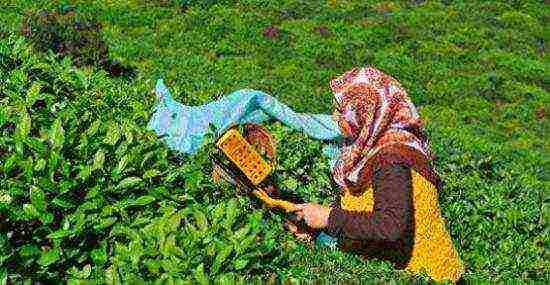
Black tea
Black tea is grown on the Black Sea coast in Rize. It has a bright and rich taste without any additives. Traders usually display it in large linen bags. You can go up and smell the tea, look at the amount of litter in it and the size of its sheets. Cheap varieties of tea usually cost $ 10-15. Expensive tea, which is really worth buying, costs $ 20-25. When bargaining, you can reduce the price by 10-20%, depending on how much tea you buy. The best time to buy Turkish black tea is early May. Since at this time it is sold well dried, but not stale.
Pomegranate tea
Pomegranate tea is tea made from dried pomegranate rind. It is produced in the southern regions of Turkey (regions of Antalya, Izmir). Contains many vitamins and trace elements that help with inflammation and poor metabolism in the body. It is sold both in markets and in stores. There are manufacturers who produce pomegranate tea packaged in packages of 100 and 200 grams. It is better to buy tea in such packages as a gift to relatives. You can buy pomegranate tea everywhere, but if you need to bring more of it, it is better to buy it at one of the tourist markets. There, as a rule, it is sold both in packages and by weight, and you can buy it in any quantity and in any package. Sellers make a 5-25% discount if you buy several packs of tea or from 0.5 kg or more. It is better to buy pomegranate tea in December, when the peels of the freshly harvested pomegranate are dried.
How to buy coffee?
Coffee in Turkey is not only a drink, but also a national tradition. The Turks began drinking coffee in the 15th century in Istanbul, after which ceremonies for drinking coffee at various events were formed. Some elements of such ceremonies have survived to this day. For example, if you have chosen an expensive item in a shop and want to bargain, the seller will certainly offer you a cup of coffee while sitting on the couch.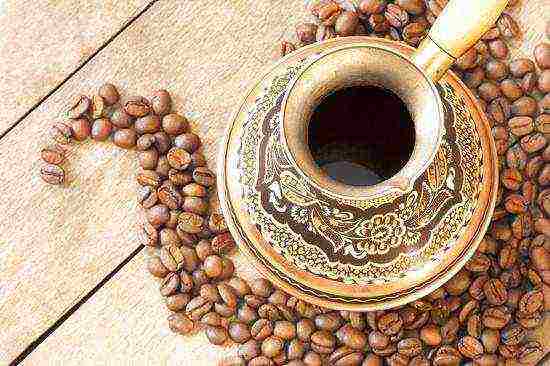
But how to choose good coffee in Turkey that has a pleasant taste and aroma? To begin with, you need to know that there are two types of coffee - shop coffee, in bags of 100 grams and in iron cans of 250 and 500 grams, and market coffee, which is sold on the market by weight. Store coffee, as a rule, is sold ground, and due to the tight packaging it is impossible to smell it. The most famous coffee brand in Turkey is Mehmet efendi. This coffee is drunk by the Turks themselves and is recommended for preparation in local recipe books. Therefore, despite the density of the package, Mehmet efendi coffee can be bought without fear of being deceived. The only thing worth paying attention to is the expiration date, so as not to acquire stale powder.In the bazaars, coffee is sold in beans, which the seller can grind at the request of the buyer. Such coffee can be smelled, touched and, if you take a lot (from 2kg), even try it. Buying coffee on the market is ideal if you are purchasing beans for yourself.
For true connoisseurs of coffee and tea, Turkey will be a pleasant discovery, because there is a wide range of products that will satisfy even the most sophisticated connoisseur of these drinks.

